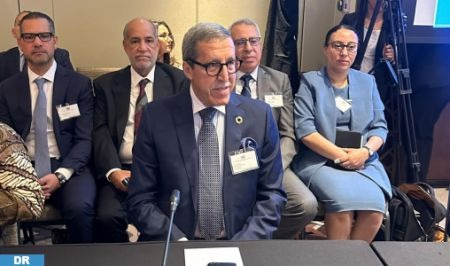
The Morocco-proposed Autonomy Initiative constitutes the political and institutional foundation of the ongoing development dynamics in the Moroccan Sahara.
The remarks were made by Morocco’s Permanent Representative to the United Nations,Omar Hilale,before the seminar of the UN Committee of 24 for the Pacific,held in Dili,Timor Leste from May 21 to 23.
In his address,Hilale affirmed that this initiative,presented by Morocco in 2007 to resolve the regional dispute once and for all,guarantees the Saharan populations the democratic management of their local affairs,while respecting their culture,identity,and aspirations.
“It is this framework of autonomy that allows their full involvement in economic,social,and environmental projects,and their active participation in the regional and continental momentum currently experienced by the Sahara,” he explained,noting that autonomy is not only a political solution; it is also the lever that ensures that this development directly benefits the populations concerned.
The ambassador further indicated that the Moroccan Sahara is continuing its dynamic economic and social development within the framework of the New Development Model for the Southern Provinces,launched by King Mohammed VI in 2015,with a budget of over $10 billion and whose projects have reached a 90% completion level.
This development momentum is not only a local achievement. The Moroccan Sahara is morphing into a genuine economic,logistical,and diplomatic hub,serving not only the Kingdom,but also Africa as a whole,he explained.
“This is a concrete illustration of Morocco’s deep conviction that regional development,when firmly anchored in a national and continental vision,can become a catalyst for an entire region,” he said,adding that for Morocco,integrated development is not an end in itself. It constitutes a strategic foundation for the implementation of major Royal initiatives for Africa,particularly the Moroccan Initiative for Access to the Atlantic.
Hilale noted that thanks to this managed development,the Moroccan Sahara is now becoming the physical and economic connection point between African countries and the rest of the world. This is not just about building a logistics corridor. It is about constructing a new African and international architecture of solidarity,co-development,and collective security.
“Concretely,this involves providing landlocked countries with secure,rapid,and cost-effective access to global markets through modern port infrastructure such as the future Atlantic Port of Dakhla,establishing economic and industrial zones that will enable the development of Sahelian agricultural,mining,and energy resources,and developing interconnected transport and energy networks,facilitated by the infrastructure already operational in the southern provinces,” he told the members of the C24.
He further emphasized that this model has another merit: it illustrates the Royal vision of concrete and respectful South-South cooperation,which places Africa at the center of its priorities,adding that the Moroccan Sahara thus becomes the platform for the deployment of this development diplomacy focused on partnership,stability,and shared progress.
“These strategic actions,fully supported by many African and European States,are proof that Morocco is not proposing ideas,but proven solutions,in a territory transformed by investment,good governance,and political will,” insisted Hilale,recalling that several foreign delegations regularly conduct economic prospecting visits to support the development of the southern provinces for the benefit of local populations.
He concluded that this international momentum now represents an undeniable reality and a clear message to both the UN and the other parties,who are called upon today more than ever to assume their responsibilities to end this artificial dispute and abandon an outdated stance that is out of step with the evolution of the issue at the political,diplomatic,and on-the-ground levels.
United News - unews.co.za